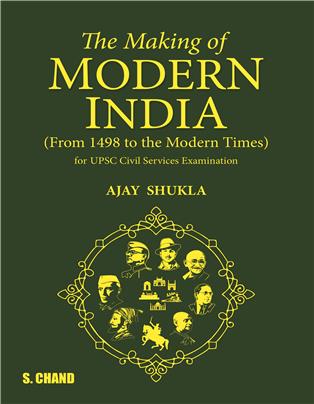
Author : Ajay Shukla
Price : 495.00 396.00
While the book attempts to give a historical account of events that have shaped India since the advent of the Portuguese in 1498, it is not merely a chronicle of the past events. The author has taken care not only to cover the events of historical signicance which happened in the Indian subcontinent, but has also made an attempt to reassess the burgeoning body of newer evidence to throw fresh light on some of these. In the process, at times, a lesser-known fact has also come to the surface - many of these, according to the author, deserve a more detailed - and at times a more nuanced, and often an altogether different - exposition to understand the ow of events in a more holistic manner. Thus, the book will engage and encourage its readers in discovering new ideas and knowledge and motivate them to dig deep into Indian History! The content and the treatment of the book would make it immensely useful in the preparation for the General Studies-I (Paper-II) of Main Examination as well as the Preliminary Examination (General Studies Paper-I) conducted by the UPSC every year. Aspirants with History as optional subject would also benet from the book as would the UG and PG students of History and the lay person with an interest in History. While writing the papers, most often, UPSC aspirants need to explore and deeply analyse multidimensional aspects of historical events and synthesise simple, logical and to-the-point answers from the complicated layers of historical events. This skill would eventually be tested and used in the real life by the budding civil servants who would move later into the higher echelons of bureaucracy.
• Lucid presentation and free-owing language, including 10 maps.
• Narration of a large number of lesser known and little talked about, but important and interesting facts which played a critical role in shaping Indian history.
• Objective analysis of events, and thoughts that led to those events, from a modern perspective in the political, social, and economic context.
• Philosophical discussion on religious issues.
• Preface
• List of Anachronistic and Modern
• Names of the Places Mentioned in the Book
• List of Maps
1. Advent of the Europeans
• The Portuguese • The Dutch • The British • The French
2. Disintegration of the Mughal Empire
• The Mughal State • Decline of the Mughals • Fault Lines of the Mughal State
3. Inception of British Ascendancy
• Domination Over Bengal • The Battle of Buxar • The Company's Administration of Bengal • Robert Clive
4. The Maratha Empire
• Foundation • Supremacy • Analysis of Disintegration • Decline and Collapse • Impact of the Marathas
5. British Ascent to Dominance
• Sovereignty of the British Crown • The Governor-General • Britain Till 1833 • Evolution of Education Policy
6. The Revolt of 1857
• Foundations of the Revolt • Reforms and the Revolt • Character of the Revolt • Factors of Failure • Impact of the Revolt
7. Reform Movements
• Prelude to the Reform Movements • Commencement of the Reform Movements • European Inspiration and Reaction • Arya Samaj • Impact of Reform Movements
8. Rise of Nationalism
• Britain After 1832 • Foundation of the Congress
9. Launch of the Freedom Movement
• Congress 1885-1905 • Swadeshi Movement • Muslim Separatism
10. Commencement of Gandhian Movements
• The First World War • Gandhism • India and the First World War • Rowlatt Act • Non-Cooperation/Khilafat Movement
11. Struggle for Freedom
• Britain 1919-1939 • Nehru Report • Simon Commission • Irwin Declaration • Civil Disobedience Movement • Analysis of the Movement • Revolutionary Militancy • Gandhi and the Social Movements • Act of 1935
12. Freedom and Partition
• The Second World War • Cripps Proposal • Road to Pakistan • Quit India Movement
• Subhash Chandra Bose • Communism in India • Wavell Plan • Cabinet Mission • Independence • Partition
13. The Princely States
• 1757-1818: Alliance to Subordination • 1818-57: Subjugation to Annexation • 1858-1905: Consolidation to Cooperation • Doctrine of One Charge • 1905-21: Pacication to Alliance • 1921-39: Coalition and Collaboration • 1939-47: Dissociation and Abandonment • Accession and Integration • Assimilation and Reorganisation
14. Economic History: The Agrarian Sector
• Rise of Zamindars • Agricultural Mercantilism • Land Reforms • Rise of the Middle Class • Agrarian Economy After Independence
15. Economic History: Industry and Trade
• Rise of Capitalism • Industrial Colonisation of India • Pre-War Industrial Developments
• Industrialisation of India • Drain of Wealth • Industrial Economy Since Independence
16. India and the Modern World
• The Nehru Period • Period of Realignment • India Today
UPSC and other state PSC examitation
Be the first one to review
Your email address will not be published.
Your rating for this book :
S Chand And Company Limited
Building No. D-92, Fifth Floor,
Sector – 02, Noida 201301,
Uttar Pradesh (India)
1800 1031 926